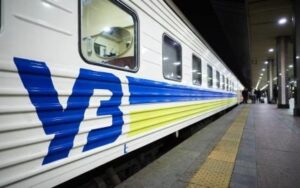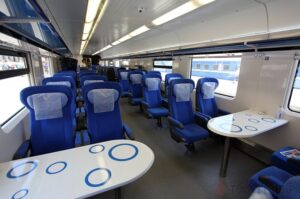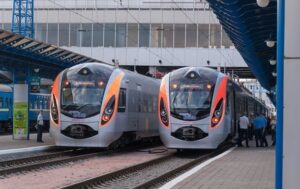
“Ukrzaliznytsia has announced the launch of ticket sales for the new international train No. 9/10 Kyiv-Budapest, the company’s press service reports.
“The long-awaited route, implemented in cooperation with the Hungarian railways, will start running on December 15,” the telegram says.
It is noted that the train will be an important step in relieving congestion at popular international destinations by providing a direct connection to Budapest, one of the key transportation hubs in the region. Passengers will be able to conveniently reach Vienna, Munich, Zurich and other European cities.
For comfortable travel, the train will also have compartment and luxury sleeping cars that meet the usual standards for Ukrainian passengers. The schedule provides for departure from Kyiv at 10:16 with arrival in Budapest at 06:00 the next day. The return flight will depart at 22:40 and arrive in Kyiv at 19:11. A ticket in a compartment carriage costs UAH 2800.
Tickets are already available in the app and on the official website of Ukrzaliznytsia.

Ukrzaliznytsia (UZ) will start equipping long-distance night trains with Wi-Fi in 2025, according to Oleksandr Pertsovsky, chairman of the board of Ukrzaliznytsia.
“We will start adding the Internet to night trains gradually. We will work on this in 2025,” Pertsovsky said at a meeting with journalists on Thursday.
He did not specify when exactly the installation of Wi-Fi equipment in long-distance trains would begin, noting that it would happen “during 2025.”
Earlier, UZ announced the launch of free Wi-Fi in ten Intercity and Intercity+ trains.
Internet access systems have already been installed on 10 Hyundai trains, two Skoda trains, two Tarpan trains, and two trains with MPLT cars. Wi-Fi access remains free for passengers during the trial period. Travelers can use 1 GB of traffic at a speed of 10 Mbps by logging in to the on-board portal portal.uz.com.ua.
In July, in response to a request from Interfax-Ukraine, UZ announced that it had installed the necessary equipment to provide Wi-Fi access on 75% of high-speed trains.

Starting December 15, Ukrzaliznytsia JSC (UZ) will launch a daily direct train between Kyiv and Budapest.
“Starting December 15, we will launch a daily direct train Kyiv – Budapest. Train No. 9/10 on this route will be another – already the 20th – international train of Ukrzaliznytsia,” the UZ press service said on Telegram on Thursday.
The train will run in standard sleeping cars: compartment (4 seats) and suite (2 seats).
“A lot of diplomatic work preceded the appointment of this flight, so that wide cars in the amount of at least eight per flight could deliver Ukrainians from/to the Hungarian capital. It is here that the Ferenc Liszt Airport is located, the largest airport in the region, many of whose flights are now synchronized with the Ukrainian train,” the press service quoted Oleksandr Pertsovsky, Chairman of the Board of UZ, as saying.
The train will depart from Kyiv at 10:16 and arrive in Budapest at 06:00. In the opposite direction: departure from Budapest at 22:40, arrival in Kyiv at 19:11. The cost of a ticket in a compartment carriage is approximately UAH 3 thousand.

Ukrzaliznytsia (UZ) has updated information on the temporary cancellation and rerouting of a number of flights due to the massive flooding in Eastern Europe, including the cancellation of the Vienna-Budapest-Kyiv flight, the rerouting of the Chop-Vienna-Chop flight, and the introduction of shuttle service on the Prague-Premyshl-Prague flight.
“The Vienna – Budapest – Kyiv flight has been canceled today. Passengers with tickets in Vienna are asked to come to the information and service center and receive vouchers for free accommodation,” the company said on its Telegram channel.
For its part, Ukrzaliznytsia clarified that the Kyiv-Budapest-Vienna flight will be heading to Budapest. The company also announced a change in the route of Chop-Vienna-Chop flights, which will be detoured to the final station of the route.
The company also informs about the cancellation of train traffic on the route Prague – Przemysl – Prague and the organization of alternative routes.
“Prague-Premysl-Prague trains are not yet able to pass the flooded area on the Czech-Polish border. Tomorrow, shuttle traffic is expected from Prague to the border and from Przemyśl to the border with a bus shuttle around the flooded area,” the carrier said.

The Verkhovna Rada has ratified the Framework Agreement between the governments of Ukraine and the Republic of Korea on loans from the Fund for Economic Development and Cooperation for 2024-2029, which opens up the possibility for Ukrzaliznytsia (UZ) to purchase another 20 Intercity+ electric trains.
“This decision paves the way for the final part of approvals on financing projects critical to the Ukrainian economy, including the program to expand Ukrzaliznytsia’s rolling stock – the purchase of 20 Intercity+ electric trains. The program has already received a favorable assessment from experts involved by the Korean Fund,” Ukrzaliznytsia said on its Facebook page on Thursday.
The ratification of the agreement was supported by 336 MPs at a parliamentary meeting on Wednesday.
According to the report, the next steps will include agreeing on the details of the project and the agreement at the Cabinet of Ministers level and the final signing of the agreement.
According to preliminary agreements, the total cost of the program will be about $450 million, including train maintenance for five years. The trains are expected to be delivered within 18-24 months after the agreement is signed.
It is emphasized that Korean manufacturers are interested in considering options for partial localization in Ukraine.
According to UZ, the loan terms are preferential, given the criticality of the social component of the project: the total term is up to 40 years, and the repayment of the loan body will begin after the first 10 years.
“This is a strategic program to expand the Intercity+ train fleet, which will allow us to increase traffic on existing and open new high-speed routes. This is an additional opportunity for 6 million passengers a year to travel, which will cover the current need for daytime high-speed traffic,” Yevhen Lyashchenko, chairman of the board of UZ, was quoted as saying in the statement.
For his part, Oleksandr Shevchenko, UZ’s spokesman for passenger services, noted on his Facebook page that this summer the railroad is serving 100,000 people a day, and many are facing a shortage of tickets.
“Yes, we provide monitoring, car buybacks, transfers, hub connections, and turn over cars twice a day with maximum efficiency, but this does not eliminate the fundamental problem of car shortages,” he wrote, listing a number of objective reasons for the situation.
Shevchenko notes that at the current rate of retirement/ageing/destruction of railcars, the shortage of railcars risks becoming critical by 2028.
“That is, you will have a conditional 30% chance of finding a ticket to Lviv, modeling a kind of optimism,” he said, adding that one solution to the problem is to purchase an additional 20 units of Korean Hyundai Rotem trains.
Shevchenko also reminded that UZ is simultaneously modernizing cars on its own, and Kryukiv Carriage Works (Poltava region) is actively building 66 new sleeping cars, including inclusive ones.

On December 29, Ukrzaliznytsia JSC (UZ) will launch an additional run of train No. 816 Lviv-Rakhiv, the UZ press service said on Friday evening.
“We are strengthening the peak transportation day on December 29 with the flight of the regional train No. 816 Lviv – Rakhiv! The train will be useful not only for residents of Lviv, but with a transfer at Lviv station – for passengers from Kyiv, Kharkiv, Poltava, Zaporizhzhia and other cities,” the message posted on UZ’s Telegram channel reads.
The company specifies that train No. 816 will depart from Lviv on December 29 at 15:22, Ivano-Frankivsk at 17:39 – 17:43, Yaremche at 19:10 – 19:14, Tatariv-Bukovel at 19:39 – 19:41, Vorokhta at 19:52 – 19:56, Yasinia at 20:34 – 20:36, Kvasy at 20:59 – 21:01, arriving in Rakhiv at 21:19. The train will also stop at the stations Khodoriv, Burshtyn, Halych, Delyatyn, Mykulychyn, Voronenko, Lazeshchyna, Svydovets, and Bilyn.
It is also reported that in Lviv, this train can be transferred from trains #79 Dnipro (22:06) – Kyiv (05:42 – 06:10) – Lviv (12:59), #86 Zaporizhzhia (18:48) – Lviv (14:15) and #63 Kharkiv (22:38) – Kyiv (05:35 – 06:35) – Lviv (13:39).